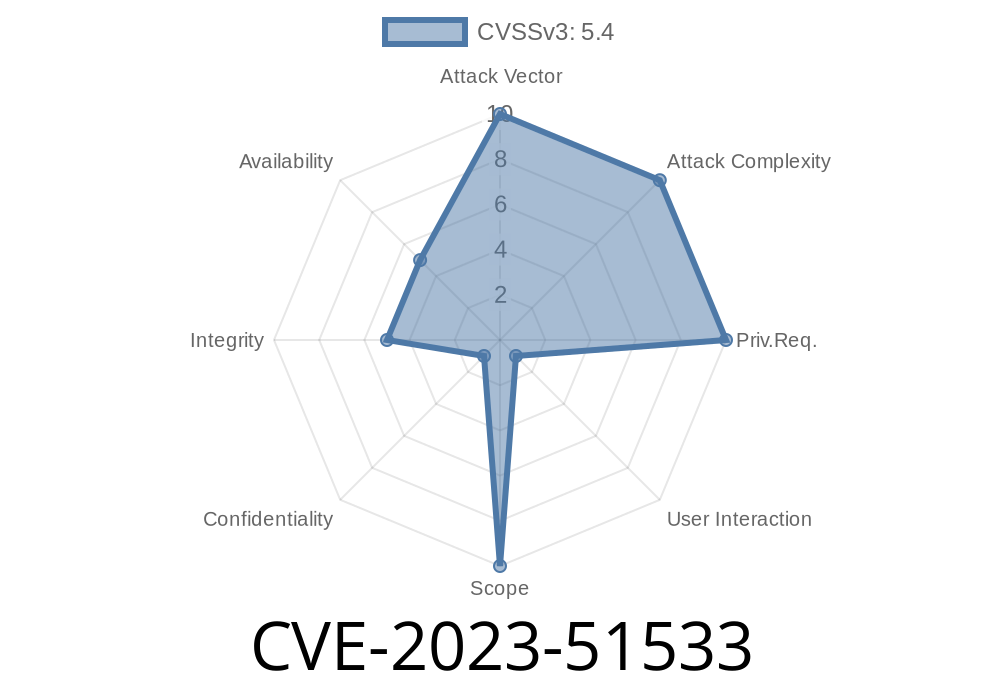Ecwid Ecommerce Shopping Cart is a popular e-commerce plugin for many website platforms, letting users add online store functionality. CVE-2023-51533 is a Cross-Site Request Forgery (CSRF) vulnerability impacting Ecwid Shopping Cart versions up to 6.12.4. This vulnerability allows attackers to trick authenticated users (like store admins) into doing actions they did not intend to—possibly changing store settings, updating items, or even leaking sensitive information.
In this long read, we’ll break down the vulnerability, show a sample exploit, and reference original sources. If you use Ecwid for your shop, keep reading to secure your site!
What is CSRF?
CSRF is when a bad actor tricks someone who is logged in into performing unwanted actions on a web application. Imagine you’re logged into your Ecwid admin panel. If you visit a website crafted by an attacker, their code could silently tell Ecwid to, say, add a product or delete one—without you knowing!
CSRF usually happens when web apps don’t check for special tokens in every request made by users. This lets hackers send forged requests that look real to the server.
The Vulnerability in Ecwid (CVE-2023-51533)
In versions up to 6.12.4, the Ecwid Shopping Cart plugin did not properly protect its sensitive admin actions with CSRF tokens. That means an attacker could create a malicious website containing requests to your Ecwid admin backend. If an admin is already logged in, those requests will work—because Ecwid can’t tell the difference between a real request and a fake one.
How Does It Happen?
Usually, you protect against CSRF by adding a “token” to every form and AJAX request—something an attacker can’t guess.
Exploit Example: Malicious Product Update
Suppose you’re logged in as Ecwid admin.
The attacker wants to change your store’s product name. They lure you to their site, and the following HTML auto-submits a hidden form back to your site (using your cookies):
<form id="csrf_form" action="https://yourstore.com/wp-admin/admin-post.php?action=ecwid_update_product"; method="POST">
<input type="hidden" name="product_id" value="12345">
<input type="hidden" name="name" value="Hacked Product Name">
<input type="hidden" name="price" value="1.00">
</form>
<script>
document.getElementById('csrf_form').submit();
</script>
When your browser loads this page, since you’re authenticated, the request goes through—and your product is renamed without your approval.
> Note: Details like the specific action endpoint or parameter names might vary depending on plugin configuration, but the concept holds for any sensitive admin action not protected by a CSRF token.
Store settings changed: Prices, product info, orders, or coupons may be manipulated.
- Account hijacking: Attacker may update email or password (if these actions have no CSRF protection).
Data leaks: Download sales or customer data.
All this can happen without any warning to admins. Just visiting the wrong site while logged in is enough.
Upgrade!
The Ecwid team fixed this in later versions. If you’re using version 6.12.4 or earlier, upgrade immediately.
Logout when not using admin panel.
- Apply Web Application Firewall (WAF): Some WAFs can block basic CSRF attempts, but this is not a substitute for patching.
References
- NVD Entry: CVE-2023-51533
- Ecwid Shopping Cart on WordPress
- OWASP CSRF Guide
- Official Ecwid Support
Conclusion
CVE-2023-51533 is a textbook example of why CSRF defenses matter, especially for sensitive web admin actions. If you deploy or maintain Ecwid Shopping Cart, check your versions and apply updates. Shop safety is your responsibility—don’t give attackers a backdoor to your e-commerce business.
Timeline
Published on: 02/28/2024 19:15:09 UTC
Last modified on: 02/29/2024 13:49:47 UTC
